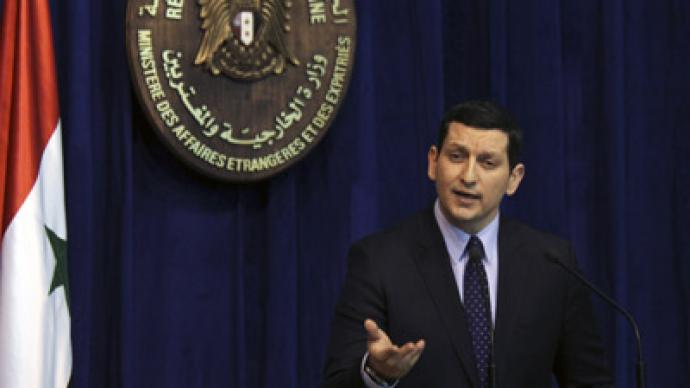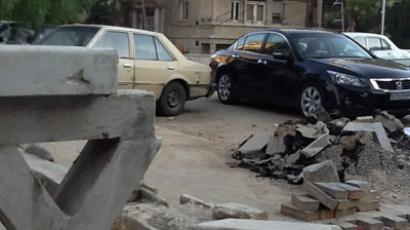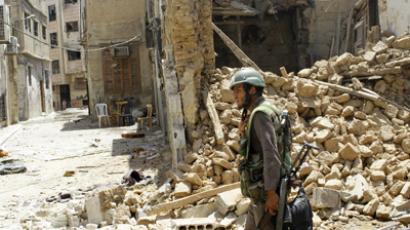Syria warns will use chemical weapons in case of foreign attack

Syria says it will only use its chemical and biological arsenal against “external aggression,” and never against own population. The US has warned the Arab country against using the arsenal under any circumstances.
Torn by a 16-month civil conflict, Syria will not use the weapons against its own people, Foreign Ministry spokesman Jihad Makdissi assured on Monday. "Any chemical or bacterial weapon will never be used – and I repeat will never be used – during the crisis in Syria regardless of the developments," he said."All of these types of weapons are in storage and under security and the direct supervision of the Syrian armed forces and will never be used unless Syria is exposed to external aggression," added Makdissi .This is the first time authorities in Damascus have admitted that they possess chemical weapons – a fact guessed by many, but never supported by concrete evidence. Syria is purportedly in possession of nerve agents, including mustard gas, as well as Scud missiles capable of delivery.The country is one of six states that have not signed the Chemical Weapons Convention, which outlaws production. Besides Syria, the list of non-signatories includes Angola, North Korea, South Sudan, Egypt, and Somalia.Following the statement, the Pentagon warned Syria not to think "one iota about using chemical weapons."Worries over the Syrian arsenal have also spilled across the EU and UN."It would be reprehensible if anyone in Syria would use weapons of mass destruction," UN Secretary-General Ban Ki-moon told reporters.UK Foreign Secretary William Hague said the use of chemicals by the Syrian government in any situation would be “unacceptable” and that the warning issued by Damascus on Monday “is typical of the complete illusion of this regime, that they are the victims of external aggression.” European Union foreign ministers stated they were "seriously concerned about the potential use of chemical weapons in Syria." This was later somewhat played down by the EU’s foreign policy chief Catherine Ashton, who said that while information is limited, there is "no reason to have an immediate concern about them being taken out or removed" from the Arab country.
Israel and US press Syria over chemical arsenal
Syria's assurances come on top of Israel and the US’s voiced worries that the chemical arsenal risks ending up in the wrong hands as the Arab country continues to face a tense internal struggle.Thus, Israeli officials made several statements intimating that they reserve the right to react should the weapons end up in the hands of Hezbollah following the fall of President Bashar al-Assad’s. Tel Aviv has not ruled out using military intervention to prevent such a scenario from playing out.Some, however, see Israel’s rhetoric as mere talk.Amos Harel, a military commentator for Israeli newspaper Haaretz, questioned the Israeli top brass’ reasons for making such loud statements, saying that they are possibly little other than a ploy to divert Israelis’ attention from problems at home. “Is the main purpose of these comments to keep the eternal flame of security worries burning and distract Israelis from other issues? It's hard to miss, for example, how the storm over the draft of yeshiva students seems to have suddenly dissipated,” he wrote in his recent column.The United States also said earlier it would "hold accountable" any Syrian official involved in the release or use of the country's chemical weapons. Still, Washington seems to be a little more in the know on the matter.Senior officials have said their intelligence data shows that the Syrian army has relocated the stockpiles of chemical weapons from their storage location in the north of the country, away from intensified fighting. Though Washington called it a “responsible step” on the behalf of the Syrian government, they nevertheless seem to want more information. Mike Rogers, the Republican chairman of the House Intelligence Committee, said the Obama administration has recently deployed resources to collect information on the whereabouts of the weapons. He declined, however, to provide any details on what resources those may be, and whether the CIA has its agents working on the ground in Syria.Some critics believe neither Washington nor Tel Aviv would have any grounds for worry, had they not been supportive of an uprising in Syria in one way or another.“Who’s supporting the Salafi fundamentalists in Syria? Who’s supporting the Arab fundamentalists who are being smuggled into Syria? If there’s danger of such weapons falling into the hands of these people, the culprit would be Israelis and the United States,” political analyst Ibrahim Alloush, from the Zaytouneh University in Jordan, told RT.














